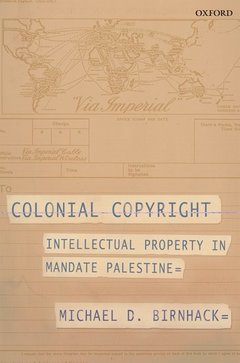Colonial Copyright Intellectual Property in Mandate Palestine
Langue : Anglais
Auteur : Birnhack Michael D.

When the British Empire enacted copyright law for its colonies and called it colonial, or Imperial, copyright, it had its own interests in mind. Deconstructing the imperial policy regarding copyright offers a startling glimpse into how this law was received in the colonies themselves. Offering the first in-depth study from the point of view of the colonized, this book suggests a general model of Colonial Copyright as it was understood as the intersection of legal transplants, colonial law, and the particular features of copyright, especially authorship. Taking as a case study the story of Mandate Palestine (1917-1948), the book details the untold history of the copyright law that became the basis of Israeli law, and still is the law in the Palestinian Authority. It queries the British motivation in enacting copyright law, traces their first, indifferent reaction, and continues with the gradual absorption into the local legal and cultural systems. In the modern era copyright law is at the forefront of globalization but this was no less true when colonial copyright first emerged. By shining a light on the introduction and reception of copyright law in Mandate Palestine, the book illuminates the broader themes of copyright law: the questions surrounding the concept of authorship; the relationship between copyright and the demands of progress; and the complications of globalization.
Introduction. 1. Colonial Transplants. 2. Colonial Copyright. 3. The Making of British Colonial Copyright. 4. Legislating Copyright in Palestine. 5. Constructing Culture and the Image of the Hebrew Author. 6. Copyright Law and Social Norms. 7. Setting the Law in Motion. 8. Copyright on the Air. 9. Telegraphic News. 10. Arab Copyright. 11. At a Crossroad. Conclusion.
Michael Birnhack is a professor of law at Tel-Aviv University, Israel. He is fascinated by the way the law treats information and the interaction between law and culture. His research focuses on copyright, privacy, and freedom of expression, which he views as different aspects of information. Before joining Tel-Aviv University in 2007, he was a member of the faculty of law at Haifa University, where he was co-founder and co-director of the Haifa Centre of Law & Technology. He served on the board of several Israeli public bodies, including the Public Council for Privacy, the Ethics Centre in Jerusalem, and the Association of Civil Rights in Israel. Birnhack testified in the Knesset numerous times, on issues of copyright and privacy. He studied law at Tel-Aviv and at NYU School of Law and prior to his academic career he was a news reporter (legal affairs) and news editor for an Israeli radio station and then a member of the founding team of Channel 2 Television News.
Date de parution : 10-2012
Ouvrage de 336 p.
17.8x24.4 cm
Thème de Colonial Copyright :
© 2024 LAVOISIER S.A.S.



